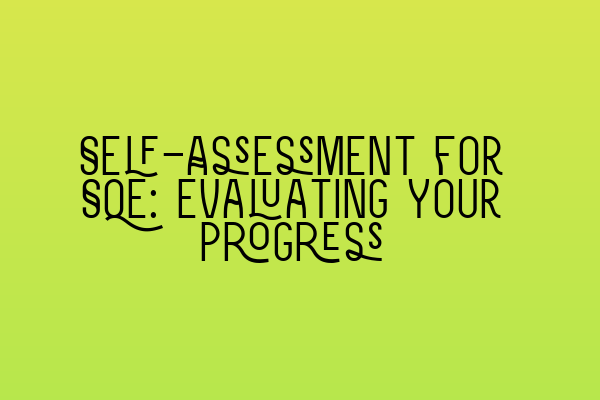—
Self-Assessment for SQE: Evaluating Your Progress
As you embark on your journey towards success in the SQE exams, it is crucial to regularly assess your progress to ensure you are on track. Self-assessment plays a fundamental role in understanding your strengths and weaknesses, identifying areas that need improvement, and tailoring your study approach accordingly. In this blog post, we will guide you through a comprehensive self-assessment process that will help you gauge your progress effectively.
Step 1: Understand the SQE Exam Structure
Before diving into self-assessment, it is essential to have a solid grasp of the structure and format of the SQE exams. Familiarize yourself with the different assessment methods, the number of questions, time limits, and the weighting of each exam. This understanding will be invaluable when evaluating your progress in specific exam areas.
Step 2: Set Clear Objectives
Establishing clear objectives is essential for effective self-assessment. Define what you aim to achieve in each exam section, whether it is a certain score or a comprehensive understanding of the topics. SMART goals (Specific, Measurable, Achievable, Relevant, Time-bound) will provide a framework to evaluate your progress objectively.
Step 3: Gather Study Materials
Ensure you have access to comprehensive study materials that cover all the required topics for the SQE exams. A diverse range of resources, including textbooks, practice questions, and online courses, will equip you with the necessary knowledge and enable you to assess your understanding and application of key concepts.
Step 4: Regular Practice Assessments
Practice assessments are invaluable in evaluating your progress in specific exam sections. Devote regular study sessions to complete mock exams or practice questions under timed conditions. Analyze your performance, identify areas where you struggle, and work on improving your knowledge and skills in those specific areas.
Step 5: Keep a Study Journal
A study journal serves as an effective tool for self-assessment. Document your learning journey, note down challenging topics, record your performance in practice assessments, and reflect on your study habits. Regularly reviewing your study journal will provide insights into your progress and help you adapt your study approach accordingly.
Step 6: Seek Feedback
Feedback from tutors, mentors, or study groups can provide valuable insights into your progress. Engage in discussions with peers, participate in study groups, or seek guidance from knowledgeable individuals who can provide constructive feedback on your understanding and application of SQE exam concepts.
Step 7: Review and Adapt
Periodically review your progress, assess the effectiveness of your study methods, and adapt your approach as required. Identify patterns in your performance, adjust your study schedule, and modify your learning techniques to optimize your preparation for the SQE exams.
Conclusion
Regular self-assessment is key to ensuring you are on the right track towards success in the SQE exams. By following the steps outlined in this blog post, you will have a comprehensive framework to evaluate your progress objectively, identify areas for improvement, and tailor your study approach accordingly. Remember, self-assessment is not only about identifying weaknesses but also recognizing and celebrating your strengths. Embrace this process as an opportunity for growth and continuous improvement.

Leave a Reply